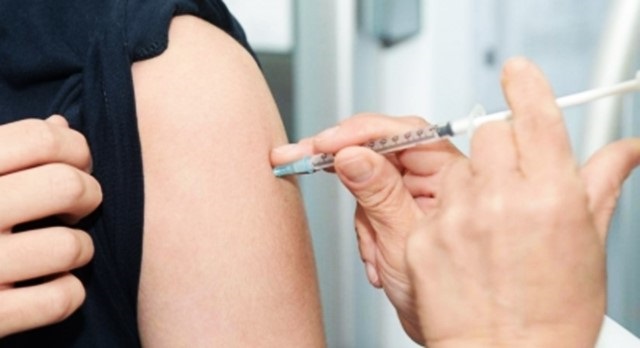

Vaccination (Photo: IANS)
New Delhi, Dec 23 (IANS) From expanding health coverage to all elderly above 70 years of age to promoting cervical cancer vaccination among young girls to slashing customs duty on cancer drugs and improving several disease rates, India has made substantial progress in healthcare in 2024.
In 2024, the Union government continued its emphasis on tackling non-communicable diseases and allocating funds for research in the healthcare sector.
The Union Budget 2024-25’s total outlay for the health sector was Rs 89,287 crore, amounting to 1.85 per cent of the budget expenditure. While it remains below the 2 per cent mark for health outlays from FY18 to FY22, it is marginally up from 1.76 per cent, and Rs 79,221 crore in the revised estimate for budget 2023-24.
It exempted customs duty on three crucial cancer drugs -- Trastuzumab deruxtecan (for breast cancer), Osimertinib (lung cancer drug for EGFR mutation), and Durvalumab (for lung and biliary tract cancers).
In addition, GST rates for these drugs were also slashed -- from 12 per cent to 5 per cent; the maximum retail price (MRP) was reduced for these drugs.
Further, the flagship health insurance scheme Ayushman Bharat Pradhan Mantri Jan Arogya Yojana (PM-JAY) was expanded to provide health coverage to all senior citizens above 70 years irrespective of their income.
The government has also worked towards medical education and infrastructure. In his address to the nation on Independence Day, PM Narendra Modi promised to create 75,000 more medical seats in the next five years, from the current over one lakh in the country to reduce foreign dependence in medical education. The government added 5,150 more seats for MBBS courses in 2024.
Over two lakh Ayushman Arogya Mandirs have been established across the country to facilitate early diagnosis and treatment. More than 14,000 Jan Aushadhi Kendras have also been launched across the country where medicines are available at an 80 per cent discount -- a significant reduction in the cost of treatment for both poor and middle-class families.
Further, emphasising the vision of 'Swasth Bharat' (Healthy India) for 'Viksit Bharat 2047', the Ministry of Women and Child Development (WCD) also introduced the Rashtriya Poshan Mission to enhance the nutritional status of children, pregnant women, lactating mothers, and adolescent girls.
Parallelly, India's digital health infrastructure has seen remarkable advancements through the Ayushman Bharat Health Account (ABHA) initiative -- a hassle-free method of accessing and sharing your health records digitally. Till December 22, more than 71.81 crore ABHA numbers have been generated and 46.53 crore health records have been linked with ABHA.
Mission Indradhanush led to the vaccination of 5.46 crore children and 1.32 crore pregnant women. The programme also includes a provision of 11 types of vaccines enhancing protection against preventable diseases. A U-WIN portal was also launched to digitise routine immunisations.
Notably, these efforts led to remarkable improvement in key health indicators, including a reduction in Maternal Mortality Ratio, Infant Mortality Rate, and Total Fertility Rate.
India also got WHO certification for eliminating trachoma -- a bacterial eye infection that can cause irreversible blindness. India is the fourth country in Southeast Asia, after Nepal, Myanmar, and Pakistan to achieve the feat.
A shorter and more effective treatment regimen for tuberculosis was also launched under the National TB Elimination Programme (NTEP). It reduced the treatment duration from 9-12 months to 6 months.
Meanwhile, the government has also launched several health projects related to the Ayush sector, with the Ayurveda manufacturing sector seeing an 8-fold growth in the last 10 years. It has led to significant growth in medical tourism resulting in about 123 regular Ayush visas and 221 e-Ayush visas issued to foreigners seeking treatment in India.